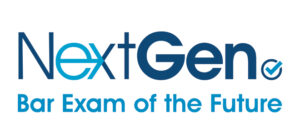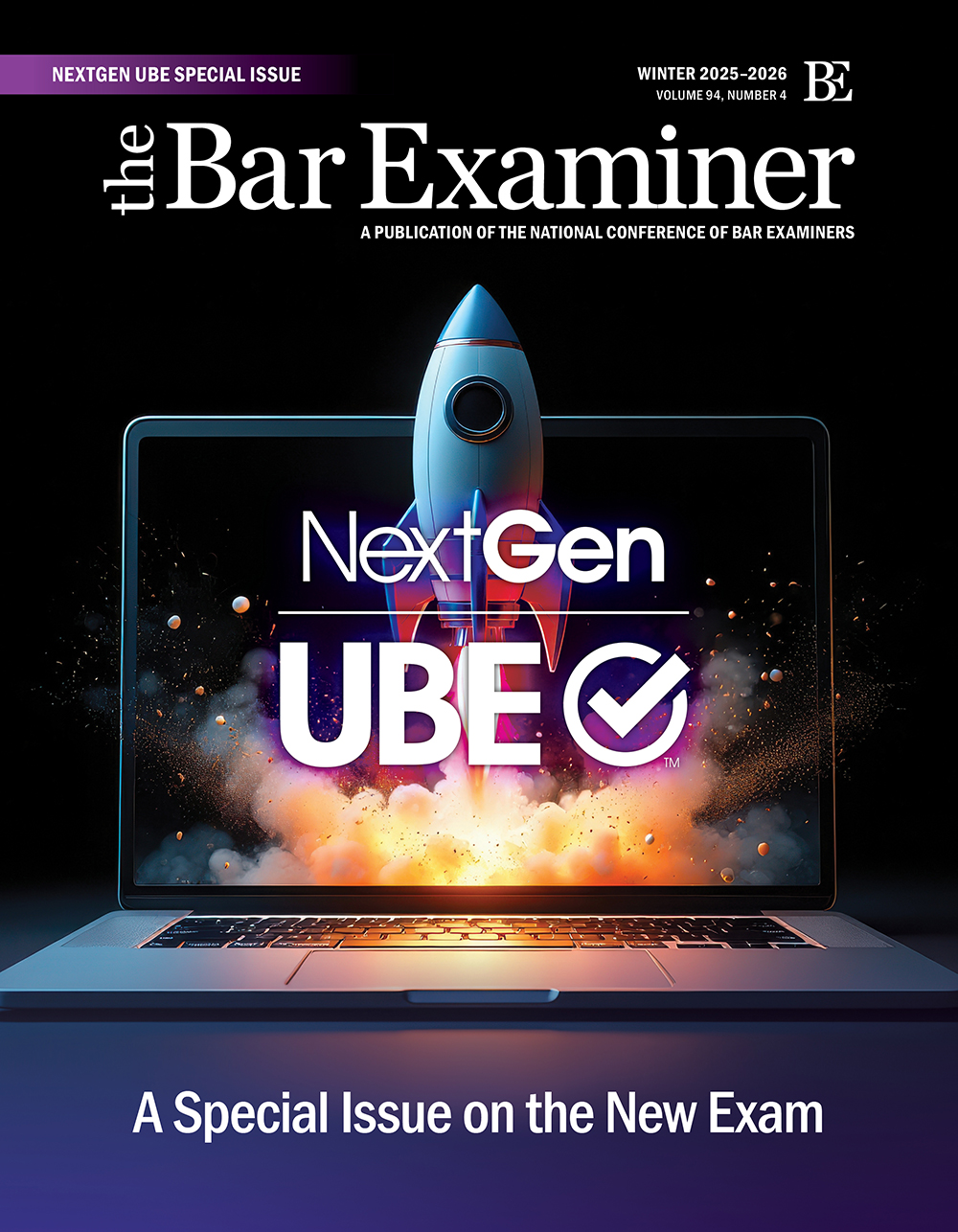This article originally appeared in The Bar Examiner print edition, Fall 2022 (Vol. 91, No. 3), pp. 19–21.By Marilyn Wellington
 The Next Evolution of the Bar Exam
The Next Evolution of the Bar Exam
NCBE is making steady progress in the development process of the next generation of the bar exam as we move closer to its first administration in July 2026. This update comes at a particularly busy time: the Content Scope Committee is nearing completion of its final content outline, teams of law professors and legal practitioners are hard at work drafting prototype exam items, the first rounds of pilot testing are complete, and new rounds are planned through the middle of next year, with field testing to follow. Ideas and input received through the three-year study conducted by the NCBE Testing Task Force, including the 2019 NCBE National Practice Analysis—the collective feedback of over 14,000 attorneys—are taking shape as we develop an exam designed to ensure that entry-level lawyers have the necessary level of knowledge and skills to practice law consistent with public protection.
Though the next generation of the bar exam will be new in many ways, this is not the first time that NCBE has developed a new exam for use by legal regulators. The new bar exam is perhaps best seen as the next step in the evolution of the modern US bar exam.
An Ongoing Evolution
The bar exam of today looks nothing like the exams administered 60 years ago, 30 years ago, or 20 years ago, and for many examinees, even 10 years ago, as jurisdictions have shifted to administering all three NCBE exam components to participate in the Uniform Bar Examination (UBE) program. Beginning with the 1972 launch of the Multistate Bar Examination (MBE), continuing with the respective additions in 1988 and 1997 of the Multistate Essay Examination (MEE) and the Multistate Performance Test (MPT), and the 2011 launch of the UBE, NCBE has, in partnership with the legal community, innovated ever since it first answered the call to develop a broadly applicable bar exam. These innovations ensure that the bar exam continually assesses foundational lawyering skills and knowledge.
As with past such innovations, the next generation of the bar exam is rooted in a comprehensive practice analysis, with one most recently completed in 2019. Notably, this same practice analysis that provided a wealth of data to inform development of the new exam, defining the objectives that now guide its progress, also validated the relevance of the current exam. The next generation of the bar exam allows us to take a meaningful step forward in assessment of candidates, placing a greater emphasis on lawyering skills, while narrowing the breadth and depth of testing of legal knowledge areas and integrating assessment of knowledge and skills to better reflect the practice of law.
Changes to the New Exam
Without doubt, the new exam will bring big changes. The wealth of data and insight gleaned from the 2019 practice analysis provided a guide for the development of an exam that will more closely assess the competencies required of a newly licensed lawyer. The exam itself will have a new structure and format, adding integrated test items that allow for evaluation of lawyering skills and knowledge of the law together, providing an exam experience that aligns with how law schools teach and how new lawyers practice today.
Although the MBE, the MEE, and the MPT effectively assess lawyering skills such as issue spotting and analysis and legal writing, the next generation of the bar exam will add skills that are central to the work of a newly licensed lawyer, including legal research, client management and counseling, negotiation and dispute resolution, and investigation and evaluation. At its core, the practice of law is about problem-solving, and these skills are central to a newly licensed lawyer’s ability to do such work. Incorporating these important areas of skills testing brings challenges in exam development and design. Testing legal research skills, for example, raises an issue of how to deliver legal resources to candidates in a manner that is accessible to all and allows them to view and use the resources seamlessly. But we have no doubt that meeting these challenges is worth the effort.
Knowledge areas have also been adjusted, modifying the assessment of knowledge based on the findings of the 2019 practice analysis and the work of NCBE’s Content Scope Committee. In determining the breadth of knowledge to be assessed on the new bar exam, two objectives guided us. First, the breadth of knowledge will be narrowed to include only those knowledge areas that cross a wide range of practice areas, from litigation to transactional work, and that newly licensed lawyers most commonly encounter. The eight foundational knowledge areas to be included on the new exam include Constitutional Law, Criminal Law, Evidence, Real Property, Contract Law, Torts, Civil Procedure, and Business Associations.
Second, the depth of knowledge assessed will be adjusted to allow for an exam experience that more closely reflects the actual practice of law. The next generation of the bar exam will distinguish knowledge areas based on the level of familiarity needed for competent practice by a newly licensed lawyer, differentiating between those areas that require in-practice, detailed knowledge without the need to consult legal resources and those that require general knowledge with access to legal resources.
The scope of knowledge and skills to be assessed by the next generation of the bar exam is detailed in a report produced by NCBE’s Content Scope Committee, a diverse committee of legal faculty, practitioners, and bar admissions administrators that served to make recommendations to NCBE on the breadth and depth of the knowledge and skills areas to be assessed. The Committee produced draft Content Scope Outlines that provide a wealth of information on these knowledge areas. (The draft outlines are available at nextgenbarexam.ncbex.org/csopc-register/.) NCBE published the draft outlines for public comment in spring 2022 and received comments and recommendations from hundreds of stakeholders, from practitioners to law faculty. The final outlines, edited based on the comments received, will be published in spring 2023.
The new exam will have notable changes in its overall structure, including integrated items intended to replicate more closely the practice of law. Whereas the UBE is one exam comprised of three distinct components—the MBE (made up of multiple-choice questions), the MEE (essay questions), and the MPT (practice performance assignments)—the new exam will be comprised of practice-type fact patterns followed by a series of multiple-choice and constructed response items. This integrated approach allows for responses that assess both the knowledge and skills required to address the practice situation at hand.
The next generation of the bar exam will move us forward technologically with a fully computer-based exam, as test items, legal resources, and candidate responses will all be displayed and entered via computer, easing issues in exam administration with the elimination of paper-based exam items, and supporting the security of exam materials. Finally, because of the significant changes to the format and focus of the exam, examinee results will be reported on a new score scale, without the breakout of written versus multiple-choice scaled scores. Prior to the launch of the new exam, NCBE will conduct a standard-setting study to provide clear data and guidance to jurisdictions as they set the passing standard for their candidates.
Maintaining Current Practices
What won’t change is how the exam is administered: as the new bar exam launches in July 2026, candidates will continue to sit for the exam in jurisdiction-managed sites, using their own laptops. Jurisdictions will continue to manage most aspects of exam administration, including making determinations on and implementing accommodated testing conditions for their candidates. NCBE will continue to support jurisdictions by producing materials and supporting administration adjustments required for accommodated testing conditions.
The bar exam will continue to be delivered to candidates twice each year, in July and February, which recognizes the benefit of this schedule to candidates as they graduate from law school and begin their legal careers. Jurisdictions will still set their own passing scores, continue to manage and evaluate the eligibility of candidates testing in their jurisdictions, including making their own decisions about participation in the transferability of scores through the UBE program, and grade the written answers of examinees who sit at their testing locations.
This evolution will bring important changes to ensure the exam continues to assess the skills and legal knowledge that are foundational to the work of a newly licensed lawyer while recognizing and maintaining many established testing and admissions practices.
Outreach and Communication
NCBE continues to prioritize outreach and communication to courts and bar admission authorities, law faculty, the bar, and other stakeholders to foreground transparency in the transition to the next generation of the bar exam. We have been pleased to visit courts and bar admission authorities in almost 20 jurisdictions to date, with more invitations arriving every week, to share current information on the new exam, engage in discussion, and answer questions. We have conducted presentations at the American Bar Association Annual Meeting, delivered online presentations to hundreds of legal educators, and participated in numerous educational programs. NCBE’s Jurisdiction Advisory Committee continues to meet to share insights and provide feedback as we move forward in the development of the new exam. These outreach efforts will continue, and we look forward to many opportunities to share information with you and to hear your feedback and field your questions.
Follow our progress and learn about opportunities for stakeholder participation by subscribing to the NextGen website at nextgenbarexam.ncbex.org/subscribe.
 Marilyn J. Wellington is the Chief Strategy and Operations Officer for the National Conference of Bar Examiners.
Marilyn J. Wellington is the Chief Strategy and Operations Officer for the National Conference of Bar Examiners.
The Next Generation of the Bar Exam
In January 2021, the NCBE Board of Trustees approved the recommendations of NCBE’s Testing Task Force for the redesign of the bar examination to ensure that it continues to test the knowledge, skills, and abilities required for competent entry-level legal practice in a changing profession.
The board appointed an Implementation Steering Committee (ISC), which is charged with general oversight of the implementation of the findings and recommendations from the Testing Task Force study. Four staff workgroups—Test Development and Psychometrics; Test Delivery and Operations; Diversity, Fairness, and Inclusion; and Strategy, Coordination, and Outreach—are working with the ISC to develop the next generation of the bar examination and ensure a smooth transition for candidates, jurisdictions, and law schools.
Contact us to request a pdf file of the original article as it appeared in the print edition.








